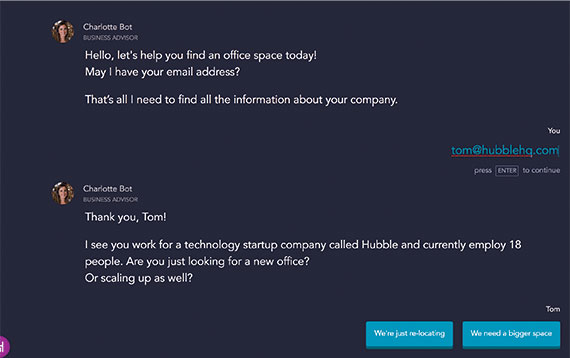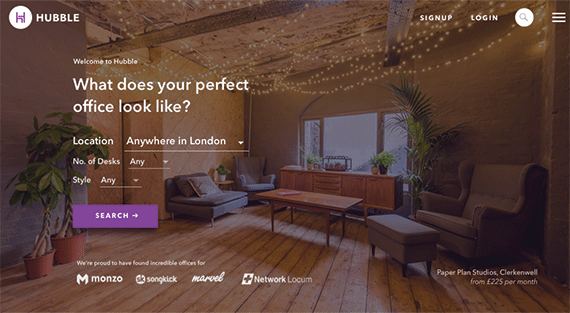“We are essentially looking to obliterate most of what commercial property agents currently do.” When it comes to mission statements, Hubble’s packs a punch, particularly when it is delivered by Rohan Silva.
One of the most influential players in London’s tech space – and David Cameron’s former tech adviser – he also happens to be one of the start-up’s three co-founders.
And the hits just keep on coming: “We are what the future of the property industry looks like,” he adds. “Almost entirely automated. And in the age of AI, when we can automate so much of the agent’s role, what is the point of a big, old-fashioned agency like Savills?”
“Hubble is the new Savills,” adds chief executive Tushar Agarwal, just in case the point wasn’t clear. “We are the new CBRE. We are the new commercial property brokers.”
It is a bold claim. Not least because this online platform – which matches people looking for office space with those who have it – is run by a team of just 17 people, half of whom have no property experience whatsoever, out of a small Shoreditch office. And yet they are confident they have the tech, the tools and the power to disrupt the commercial property sector beyond all recognition.
The thing is, they might. The three-year-old site now gets 30,000 searchers a month, has more than 20,000 desks available to rent and is attracting major tenants – including Jaguar Land Rover, Mouchel and Ernst & Young.
As far as the Hubble team is concerned, they are perfectly placed to disrupt what Silva describes as “the pretty shady world of office brokers”.
The team is now preparing to launch a system that they say will use AI-enabled searches to deliver within 30 seconds what a traditional agent would need around three days to research and collate. But even if this does become a reality, will occupiers really turn their backs on traditional agents en masse in favour of an automated system and a robot called Charlotte?
Small beginnings
Three years ago, Hubble started life as a platform solely aimed at small businesses, start‑ups and entrepreneurs looking for desks and short-term office space in London.
“That is how we started, but then big companies such as Jaguar Landrover started to approach us,” says Silva. “Companies that want the sort of flexibility they just can’t get through traditional 15- and 25-year leases. It is a real reflection of how dramatically the office market has changed and it has become clear there is a huge demand for a platform like ours. Now we are planning to launch an AI-enabled search engine that will find space for occupiers of all sizes faster than ever and will allow us to disrupt the commercial agency world.”

All three co-founders – Silva, Agarwal and 26-year-old computer scientist and chief technology officer Tom Watson – are unashamedly open and honest about their plans for market domination, no matter how many feathers they might ruffle.
Because unlike many a proptech start-up, they are not looking for buy-in from the real estate industry: “We are not producing software to sell to other companies,” says former investment banker Agarwal. “We are directly taking market share. And we are doing that because we can offer occupiers a better experience and a better service than what is currently available. We don’t represent landlords. We are here to make life easier for tenants.”
As for the tech itself, a quick system demonstration proves that the new platform can indeed fly through in seconds what it would take most agents hours or days to achieve. Once the upgraded site launches later this year, searchers will be able to start a real-time conversation with a robot (Charlotte), based on Hubble’s tenant advisory lead and former Deloitte surveyor Charlotte Timms.
The robot starts by asking for an email address and, from that, the system will be able to identify which company the searcher works for – as well as how many people the firm employs, how often it has moved premises in the past five years and which areas it has moved to and from.

A follow-up question asks if the searcher would like to stay in the area they are currently based in or move somewhere else and, based on their response, throws up suitable options – all complete with an option to do a virtual reality tour.
“When we turn on the AI, occupiers will be able to interact with software that can give them suitable recommendations, based on an email address, within a few seconds,” says Watson. “We use open data sources to pull all of this information down in real time. Essentially, we see this platform as an automation of the agent’s role. At the moment the main part we are looking to automate is the search aspect.
“We can eliminate the need for someone to scan Companies House, go on to the website of each and every searcher, look at their address, find out where they have been based in the past through research, try to find out if they are hiring, scheduling calls and co-ordinating calendars to collate this information. We can do all that very quickly drawing on these data sets.”
But he adds that what Hubble is planning next on the tech and data side is where things get really interesting: “The amount of data we are collecting through 30,000 searches a month means we can use that to work out things such as the average number of desks people tend to have, the areas they are moving from, where they want to move to and the sort of space that certain businesses choose to go into. With this data we can start to make assumptions and judgments to better inform future users.”
Agarwal explains with an example: “From the data we have already gathered, we can see that most people who are based in Shoreditch tend to want to stay there when they are looking for new space. And we can also see a trend emerging of companies moving from Canary Wharf to the City. So if someone based in the former logs on, the system can suggest that move based on common patterns.
“All our data is collected in real time and, crucially, we can show intent. This really is key when you are looking to advise occupiers. We can see, very clearly, where people are intending to move to, which is gold dust. Just because Shoreditch is the place to be right now for, say, tech companies, it doesn’t mean it always will be.”

Fewer agents
Silva says he is in no doubt that, if Hubble reaches the dizzying heights he is hoping for, there will be fewer agents around in five years’ time. “A human is expensive and it is not economical for them to be dealing with looking for workspace and offices space when Hubble can do thousands of these transactions a second – on a platform that can be easily scaled and rolled out internationally, to the point where we could be doing millions of transactions a second eventually.”
“We also have no capacity limit,” adds Agarwal. “One of the biggest problems occupiers encounter with agents is that they leave them hanging, they don’t respond to emails fast enough, they can’t get through processes quickly enough because they are limited by human capacity. There are only so many calls one person can make in a day. Only so many emails they can respond to. But on our platform you can have an infinite number of people going through the same experience at the same time.”
But both insist that for the “smart agents” who work alongside Hubble, the future looks brighter than ever. “If people are really honest with themselves, a lot of what the commercial agents do on a day-to-day basis is really boring,” says Silva.
“Responding to potential enquiries, assembling potential tours, searching for information – it’s long and laborious. An agent’s value comes from the human interaction part, the negotiation, the transaction itself. We don’t see what we are doing as a threat to the good agents. We see it as a liberation for them to do what they are best at. It means that the agents that are still around in a few years will be earning more, will be happier and will be more productive.”
Little surprise that he adds the fastest route to this magical agency nirvana is to “work with Hubble”.But just how likely is that to become a reality? Especially in the face of such an offensive form of attack on what currently makes up the majority of commercial brokers’ jobs? Silva stands his ground.
As far as he is concerned, the agents may well find they just don’t have a choice: “Agents just aren’t giving clients what they want. Especially when it comes to tech companies, SMEs and big companies who want flexible space. This means there will be a different future.
“It will mean change and it will be a shock. But we are working with big agents such as Cushman & Wakefield already and some others who recognise that they will make money by working with us and will keep their clients happier.
“The benefit of being an outsider to the property industry like most of us are at Hubble is that we can look at things using that wonderful outside perspective and say, ‘Why does it have to work like that?’ and that’s exactly what we have done.”
To send feedback, e-mail emily.wright@egi.co.uk or tweet @EmilyW_9 or @estatesgazette
■ This article was originally published on 8 March 2017
TECH SPECIAL
-
Leslau backs de Savary’s Built-Id
-
Aaron Block: ‘Capital needed for UK prop tech growth’
-
Lifi could replace wifi in 10 years
-
Hubble: disrupting the shady world of office brokers
-
Proptech consolidation on the cards
-
TechTalk: robots will humanise business communication and other lessons in tech
-
Antony Slumbers: Know what you know, and what you do not
-
EG‘s tech talk: a round-up of tech news across the real estate industry











